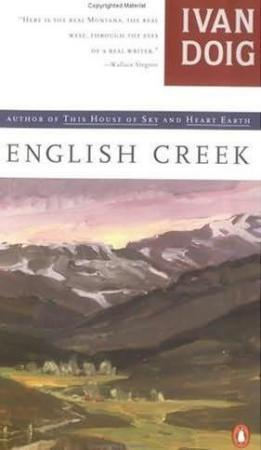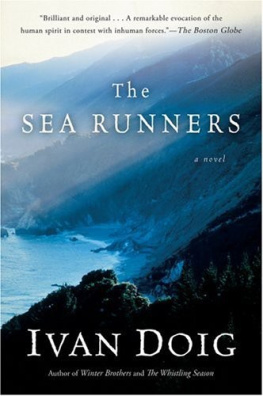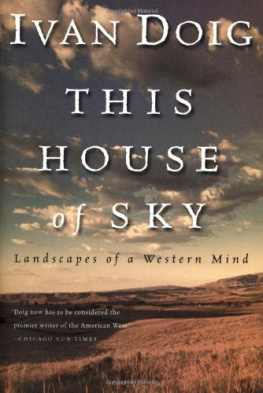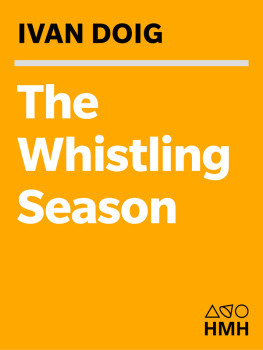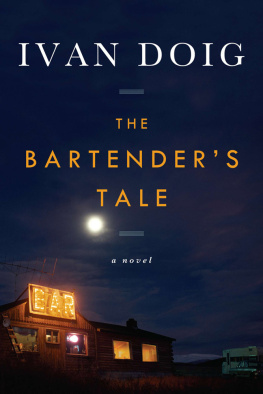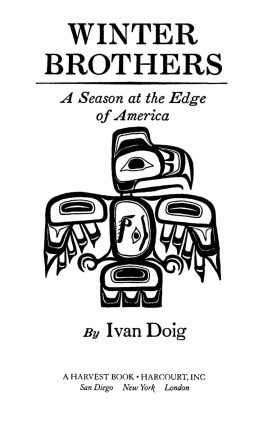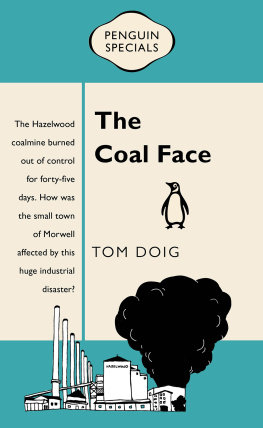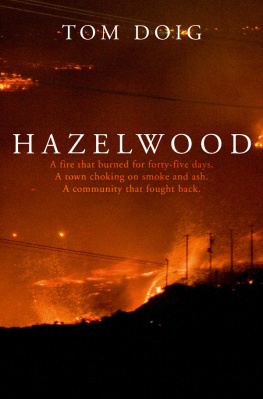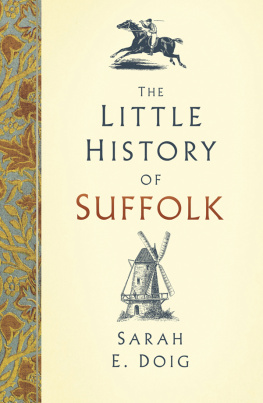English Creek
Ivan Doig
1984
Again for Carol
"You got to make your way
in this pig iron world."
Miss Rose Gordon (1885-1968)
ONE
This time of year, the report from thedust counties in the northeastern part of the state customarily hasit that Lady Godiva could ride through the streets there without eventhe horse seeing her. But this springs rains are said to havethinned the air sufficiently to give the steed a glimpse.
GROSVENTRE WEEKLY GLEANER JUNE 1
THAT MONTH of June swam into the Two Medicinecountry. In my life until then I had never seen the sidehills come sogreen, the coulees stay so spongy with runoff. A right amount of wetevidently could sweeten the universe. Already my father on his firsthigh patrols had encountered cow elk drifting up and across theContinental Divide to their calving grounds on the west side. They,and the grass and the wild hay meadows and the benchland alfalfa, allwere a good three weeks ahead of season. Which of course accountedfor the fresh mood everywhere across the Two. As is always said,spring rain in range country is as if halves of ten-dollar bills arebeing handed around, with the other halves promised at shipping time.And so in the English Creek sheepmen, what few cowmen were left alongNoon Creek and elsewhere, the out-east farmers, the storekeepers ofGros Ventre, our Forest Service people, in just everyone that startof June, hope was up and would stay strong as long as the grass did.
Talk could even be heard that Montana maybe at lasthad seen the bottom of the Depression. After all, the practitionersof this bottomed-out notion went around pointing out, last year was abit more prosperous, or anyway a bit less desperate, than the yearbefore. A nice near point of measurement which managed to overlookthat for the several years before last the situation of people on theland out here had been godawful. I suppose I ought not to dwell ondollar matters when actually our family was scraping along betterthan a good many. Even though during the worst years the ForestService did lay off some peopleHoovered them, the saying wentmyfather, ranger Varick McCaskill, was never among them. True, hissalary was jacked down a couple of times, and Christ only knew if thesame wasnt going to start happening again. But we were getting by.Nothing extra, just getting by.
It gravels me every time I read a version of thosetimes that makes it sound as if the Depression set in on the day WallStreet tripped over itself in 1929. Talk about nearsighted. By 1929Montana already had been on rocky sledding for ten years. The winterof 1919men my fathers age and older still just called it "thatsonofabitch of a winter"was the one that delivered hardtimes. Wholesale. As Dode Withrow, who had the ranch farthest up thesouth fork of English Creek, used to tell: I went into that 19winter with four thousand head of ewes and by spring theydevaporated to five hundred."
Trouble never travels lonesome, so about that sametime livestock and crop prices nosedived because of the end of thewar in Europe. And right along with that, drought and grasshoppersshowed up to take over the dry-land farming. "It began to bejust a hell of a situation," my father always said of thoseyears when he and my mother were trying to get a start in life."Anyplace you looked you saw people who had put twenty yearsinto this country and all they had to show for it was a pile of oldcalendars." Then when drought circled back again at the start ofthe thirties and joined forces with Herbert Hoover, bad progressed toworse. That is within my own remembering, those dry bitter years.Autumn upon autumn the exodus stories kept coming out of the HighLine grain country to the north and east of us, and right down hereon the highway which runs through the town of Gros Ventre anybody wholooked could see for himself the truth of those tales, thefurniture-loaded jitney trucks with farewells to Montana paintedacross their boxboards in big crooked letters: GOODBY OLD DRY and ASFOR HAVRE YOU CAN HAVE ER. The Two country did have the savinggrace that the price for lambs and wool recovered somewhat whileother livestock and crops stayed sunk. But anybody on Two land whodidnt scrape through the early thirties with sheep likely didntscrape through at all. Cattle rancher after cattle rancher and farmerafter farmer got in deep with the banks. Gang plow and ditcher, workhorses and harness, haymow and cream separator: everything on thoseplaces was mortgaged except the air. And then foreclosure, and theauctioneers hammer. At those hammer sales we saw men weep, womenas stricken as if they were looking on death, and their childrenbewildered.
So it was time hope showedup.
* * *
Jick! Set your mouth for it!"
Supper, and my mother. It is indelible in me that allthis began there right at the very outset of June, because I wasworking over my saddle and lengthening the stirrups again, to accountfor how much I was growing that year, for the ride up with my fatheron the counting trip the next morning. I can even safely say what theweather was, one of those brockled late afternoons under the Rockieswhen tag ends of storm cling in the mountains and sun is reachingthrough wherever it can between the cloud piles. Tell me why it isthat details like that, saddle stirrups a notch longer or sunshinedabbed around on the foothills some certain way, seem to be theallowance of memory while the bigger points of life hang back. Atleast I have found it so, particularly now that I am at the timewhere I try to think what my life might have been like had I not beenborn in the Two Medicine country and into the McCaskill family. Oh, Iknow whats said. How homeground and kin together lay their touchalong us as unalterably as the banks of a stream direct its water.But that doesnt mean you cant wonder. Whether substantially thesame person would meet you in the mirror if your birth certificatedidnt read as it does. Or whether some other place of growing upmight have turned you wiser or dumber, more contented or less. Herein my own instance, some mornings I will catch myself with a full cupof coffee yet in my hand, gone cold while I have sat here stewingabout whether my threescore years would be pretty much as they are bynow had I happened into existence in, say, China or Californiainstead of northern Montana.
Any of this of course goes against what my motherforever tried to tell the other three of us. That the past is ataker, not a giver. It was a warning she felt she had to put out, inthat particular tone of voice with punctuation all through it, fairlyoften in our family. When we could start hearing her commas andcapital letters we knew the topic had become Facing Facts, Not GoingAround with Our Heads Stuck in Yesterday. Provocation for it, I willsay, came from my father as reliably as a dusk wind out of a canyon.Half a night at a time he might spend listening to Toussaint Rennietell of the roundup of 1882, when the cowmen fanned their crews northfrom the elbow of the Teton River to the Canadian line and brought ina hundred thousand head. Or the tale even bigger and earlier thanthat, the last great buffalo hunt, Toussaint having ridden up intothe Sweetgrass Hills to see down onto a prairie that looked burnt, sodark with buffalo, the herd pinned into place by the plains tribes.Strange, but I can still recite the tribes and where they pitchedtheir camps to surround those miles of buffalo, just as Toussaintpassed the lor e of it to my father: Crows on the southeast, GrosVentres and Assiniboines on the northeast, Piegans on the west, Creesalong the north, and Flatheads here to the south. "Something tosee, that mustve been," my father would say in his recountingto the rest of us at supper. "Mac, somebody already saw it,"my mother would come right back at him. "What youd better PutYour Mind To is the Forest Supervisors Visit Tomorrow." Or ifshe didnt have to work on my father for the moment, there was Alecwhen he began wearing a neck hanky and considering himself a cowboy.That my own particular knack for remembering, which could tuck awayentire grocery lists or whatever someone had told me in innocence acouple of weeks before, made me seem likely to round out a housefulof men tilted to the past must have been the final stem on mymothers load. "Jick," I can hear her yet, "thereisnt any law that says a McCaskill cant be as forward-lookingas anybody else. Just because your father and your brother"
Next page
